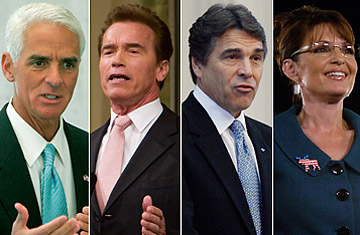
From left: Florida Governor Charlie Crist, California Governor Arnold Schwarzenegger, Texas Governor Rick Perry and Alaska Governor Sarah Palin
(2 of 2)
As of Tuesday, Martinez, like most of his GOP colleagues on Capitol Hill, appeared to be sticking to his guns, criticizing the bill for supposedly wasteful spending and not enough tax cuts. But Crist insists those concerns shouldn't override "the fact that this thing is going to pass in any case. This is also Florida taxpayers' hard-earned money, and we have to fight for our fair share of the dollars."
Crist is not in an enviable position these days, as he gets hit from all sides. Fiscal conservatives say his Accelerate Florida spending hasn't stopped the state's unemployment rate from rising above 8%, while those on the left say his lowering of Florida's exorbitant property taxes has given the GOP-led legislature an excuse to make steep budget cuts in schools and health care — cuts that Crist last month had to step in and reverse amid citizen complaints. "I'm a fiscal conservative," says Crist, "but I just returned from visiting an unemployment office in Orlando, and something has to be done."
Republicans like Douglas, the head of the National Governors Association, who met with Obama at the White House last week, say they too object to some parts of the stimulus but feel it's a price worth paying "to get America moving again." However, Sanford and other conservative governors, like Louisiana's Bobby Jindal, Mississippi's Haley Barbour and Alaska's Sarah Palin — all of whom signed a statement last week against Obama's plan — fear that the moderates are selling out the GOP in the long run for a short-term spending orgy. They also object to what even moderate Republicans worry are cumbersome strings attached to the federal largesse. "I will oppose any stimulus package that results in federal control over state-administered programs," said Barbour. Sanford, who on Monday night had to listen to Obama in his White House press conference take a swipe at dilapidated 19th century South Carolina school buildings, asserted last week that the stimulus will "serve to prolong and deepen this economic slowdown."
Still, even if a GOP guv were to reject federal stimulus money on principle, the legislation may give state legislatures power to take it anyway — a tool even Republicans in the Texas legislature said this week they're ready to use. But it's unlikely to come to that, especially since governors who oppose the stimulus don't lose anything — and gain a free infusion of cash — when the stimulus dollars start rolling in.
"Sanford and other conservative governors have staked out some justifiable positions on the stimulus," says Leslie Lenkowsky, a public-affairs professor at Indiana University who served in George W. Bush's Administration with Indiana's Republican governor, Mitch Daniels. (Daniels also offered the stimulus support before Obama on Monday visited his state, another GOP stronghold that, like Florida, went for Obama.) "But I would find it amazing if in the end they didn't accept the money. The job of a congressional opposition is to oppose, but the job of state governors is to make state government work."
Obama tried to tweak the conservative governors as well as Republicans in Congress when, in his speech at Fort Myers, he suggested that "governors understand an economic crisis in a way that maybe folks a little more removed don't." Which is why Crist and the moderates are probably making the safer bet among GOP governors. The severity of the crisis means that stimulus, love it or hate it, is a train that's pulling into all of their states. So the governors who may stand to emerge looking smartest are those who, as Crist puts it, "know how to adapt to it." And, most important, use it to stay in the black.
